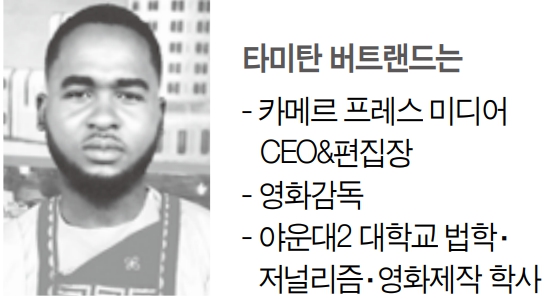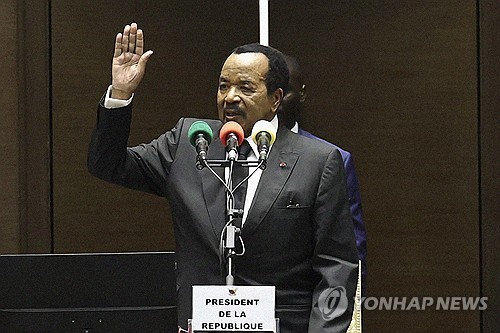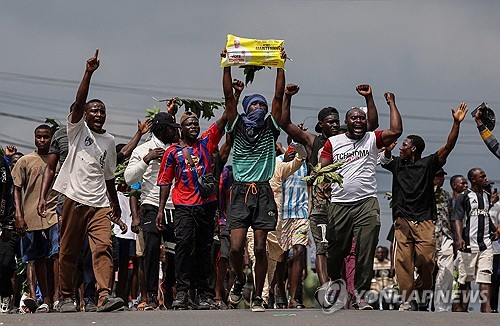
For 43 years, Cameroon has lived with lies and frustration.
In the early hours of Monday, 27 October 2025, Cameroon’s Constitutional Council officially declared President Paul Biya the winner of the 12 October presidential election, awarding him 53.66% of the vote. Former communications minister turned opposition candidate Issa Tchiroma Bakary received 35.19% according to official results.
Biya, 92 years old and in power since 1982, now embarks on an eighth term under a cloud of unrest, distrust, and widespread skepticism. His long-standing rule — punctuated by the removal of presidential term limits in 2008 — has been widely criticized for weakening institutions, curbing accountability, and entrenching autocratic practices.
The 2025 election was shaped less by the mechanics of democracy than by the pressure of a populace desperate for change. Tens of thousands across the Far North, North, Northwest, Southwest, and major cities like Douala and Yaoundé viewed the vote as perhaps their last opportunity to reclaim their political voice.
Issa Tchiroma Bakary’s campaign used his insider knowledge of the Biya regime while positioning himself as a reformist promising transparency, accountability, and youth engagement. His strongest support emerged from the Northwest, North, and Far North, where demonstrators later staged mass rallies contesting the official results.
Meanwhile, President Biya relied on a narrative of continuity, stability, and loyalty to state institutions, emphasizing incremental infrastructure projects and security in conflict-affected regions. His advanced age and persistent rumors about declining health fueled fears about succession and governance capacity. Young Cameroonians in urban centers increasingly view his rule as a symbol of stagnation and a system that rewards longevity over merit.

In the Anglophone Northwest and Southwest, years of separatist conflict and insecurity made voting dangerous and uncertain. Official reports nevertheless claimed unusually high turnout — figures many locals and observers rejected as implausible. Analysts warned the disputed numbers could escalate tensions, merging Anglophone grievances with northern unrest into a nationwide flashpoint.
Economic pressures further fueled frustration: persistent youth unemployment, regional inequality, inflation, and stalled infrastructure deepened dissatisfaction. Traders, artisans, teachers, and civil servants voiced that the country’s problems could not be resolved under a leadership unchanged for four decades.
The 12 October vote took place under tight security. Reports of internet restrictions, polling irregularities, and disruptions across Anglophone and northern regions raised early concerns of manipulation. Despite obstacles, turnout remained high in some urban centers and Tchiroma strongholds in the Far North — a sign of determination among citizens.
Days later, Tchiroma declared himself the winner, citing independent tallies. Supporters mobilized in unprecedented numbers. Streets in Garoua, Maroua, Douala, and Bamenda filled with thousands demanding transparency. Placards declared “Respect Our Vote,” “Enough Lies,” and “No More Biya.” General strikes paralyzed markets, offices, schools, and transport systems.
Eyewitnesses reported confrontations with security forces using tear gas, water cannons, and live ammunition. Independent observers estimated at least 48 people killed, hundreds injured, and thousands detained. Rights groups warned of arbitrary arrests of protesters, journalists, and activists.
Across the country, citizens expressed deep disillusionment. “For 43 years it has been the same lies, the same promises,” said a university student in Douala. An elderly trader in Maroua lamented, “We have been patient, but Biya does not hear us.”
Whenever social media was accessible, images of strikes, protests, and repression spread rapidly.
The unrest severely disrupted economic life. Curfews and roadblocks in cities including Yaoundé, Douala, and Bamenda hindered commerce and transportation. Northern regions faced agricultural transport delays threatening food supply. Markets partially closed, small businesses recorded steep losses, and investors hesitated amid uncertainty. Public services — hospitals, schools — experienced staff shortages due to strikes.
Despite the turmoil, Paul Biya was sworn in for an eighth term on 31 October 2025 in Yaoundé. Dignitaries from the African Union and some international partners attended, but the ceremony was overshadowed by nationwide demonstrations. Protesters clashed with security forces, chanting against “lies” and “stolen votes” and demanding real change.
The moment highlighted the gulf between formal state procedures and public sentiment.
Cameroon now stands at a precarious crossroads. One path would require the Biya government to pursue reforms targeting youth unemployment, regional inequality, and governance transparency. Biya pledged infrastructure, social programs, and youth engagement — but citizens remain skeptical after 43 years of repeated promises.

The other path risks deeper crisis: continued repression, sidelining opposition voices, and ignoring grievances could erode nationwide confidence in state institutions. Analysts warn that combining fraud allegations with existing discontent and low trust could make the country highly volatile through 2026.
International reactions were firm but measured. The African Union and United Nations urged restraint and transparency. France called for dialogue. The United States expressed concern over intimidation and violence. AU envoy Fatou Bensouda stressed that Cameroon must prevent a descent into conflict and ensure citizens’ voices are heard through institutions, not only the streets.
Biya’s re-election signals continuity but carries enormous risk if public discontent is ignored. For a nation grappling with Far North insurgency, Anglophone separatism, poverty, and a restless youth population, the 2025 election exposed the fragility of its democracy. Citizens remain steadfast in demanding accountability, transparency, and tangible reforms.
Protests, strikes, and disillusionment underscore the urgency of bridging the divide between government and governed. If ignored, the rhetoric of “change or chaos” may become a lived reality.
As dusk falls over Yaoundé, Douala, Bamenda, Garoua, and Maroua, the streets remain tense but defiant. Markets, offices, and schools partly closed, citizens continue expressing discontent. The swearing-in of Paul Biya — legally decisive — does little to restore trust in a political system seen as broken after more than four decades.
Cameroon stands at a crossroads, the trajectory of governance, legitimacy, and civil stability in question, with the eyes of the world watching.

